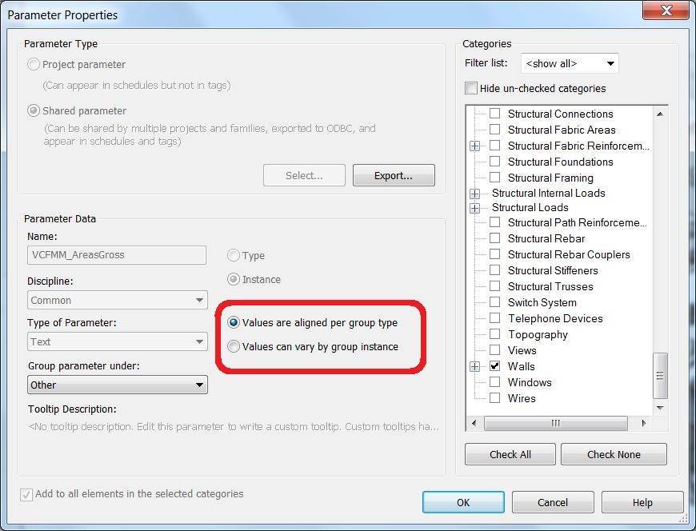Setting Parameter Varies Between Groups
We already looked at the topic of setting the SetAllowVaryBetweenGroups flag on a shared parameter
in Scott Conover's parameter definition overview.
The setting was introduced in the Revit 2014 API, cf. Parameter variance among group instances.
Now Miroslav Schonauer raised it again, asking:
Question: Is the following option for group behaviour of shared param instance bindings exposed to API?

If yes, that solves all the issues :-)
If not – the default outcome seems to be aligned per group type.
Is there any way to set can vary by group instance (what I need) the default for API-created bindings?
Later: I found this Revit API discussion forum thread on creating a project parameter with values can vary by group instance selected which explains that it is kind-of possible.
The problem remains that SetAllowVaryBetweenGroups is available only on InternalDefinition, while my programmatically created shared param has ExternalDefinition.
That thread explains that getting the binding after it has been created (i.e., in a 'Step 2') does return InternalDefinition, so this method can be used.
Can someone at least confirm that there is nothing simpler to do than the above 2-step process?
Answer: Yes. You need to do the two-step process:
- Register the shared parameter
- Find the internal definition
- Set the appropriate value for this property
The easiest way to go from one to the other:
Response: I implemented this method to handle the setting of the SetAllowVaryBetweenGroups flag:
/// <summary> /// Helper method to control `SetAllowVaryBetweenGroups` /// option for instance binding param /// </summary> static void SetInstanceParamVaryBetweenGroupsBehaviour( Document doc, Guid guid, bool allowVaryBetweenGroups = true ) { try // last resort { SharedParameterElement sp = SharedParameterElement.Lookup( doc, guid ); // Should never happen as we will call // this only for *existing* shared param. if( null == sp ) return; InternalDefinition def = sp.GetDefinition(); if( def.VariesAcrossGroups != allowVaryBetweenGroups ) { // Must be within an outer transaction! def.SetAllowVaryBetweenGroups( doc, allowVaryBetweenGroups ); } } catch { } // ideally, should report something to log... }
It assumes that guid comes from a known shared parameter.
Further good news: this can be called not only immediately after programmatically binding a new shared param, but also to silently change this specific setting for an existing shared parameter.
For example, we all typically have our own helper methods to get-or-create a shared parameter binding, cf., e.g., my method to add a category to a shared parameter binding.
Here is a code snippet providing enough to get the gist of how the above can be used (ignore my helper classes and error handling):
// Assumes outer transaction public static Parameter GetOrCreateElemSharedParam( Element elem, string paramName, string grpName, ParameterType paramType, bool visible, bool instanceBinding, bool userModifiable, Guid guid, bool useTempSharedParamFile, string tooltip = "", BuiltInParameterGroup uiGrp = BuiltInParameterGroup.INVALID, bool allowVaryBetweenGroups = true ) { try { // Check if existing Parameter param = elem.LookupParameter( paramName ); if( null != param ) { // NOTE: If you don't want forcefully setting // the "old" instance params to // allowVaryBetweenGroups =true, // just comment the next 3 lines. if( instanceBinding && allowVaryBetweenGroups ) { SetInstanceParamVaryBetweenGroupsBehaviour( elem.Document, guid, allowVaryBetweenGroups ); } return param; } // If here, need to create it (my custom // implementation and classes…) BindSharedParamResult res = BindSharedParam( elem.Document, elem.Category, paramName, grpName, paramType, visible, instanceBinding, userModifiable, guid, useTempSharedParamFile, tooltip, uiGrp ); if( res != BindSharedParamResult.eSuccessfullyBound && res != BindSharedParamResult.eAlreadyBound ) { return null; } // Set AllowVaryBetweenGroups for NEW Instance // Binding Shared Param if( instanceBinding ) { SetInstanceParamVaryBetweenGroupsBehaviour( elem.Document, guid, allowVaryBetweenGroups ); } // If here, binding is OK and param seems to be // IMMEDIATELY available from the very same command return elem.LookupParameter( paramName ); } catch( Exception ex ) { System.Windows.Forms.MessageBox.Show( string.Format( "Error in getting or creating Element Param: {0}", ex.Message ) ); return null; } }
I added Miro's method SetInstanceParamVaryBetweenGroupsBehaviour
to The Building Coder samples release 2018.0.134.11 in
the module CmdCreateSharedParams.cs L441-L470.
Many thanks to Miro for raising this issue and sharing his approach to solve it!